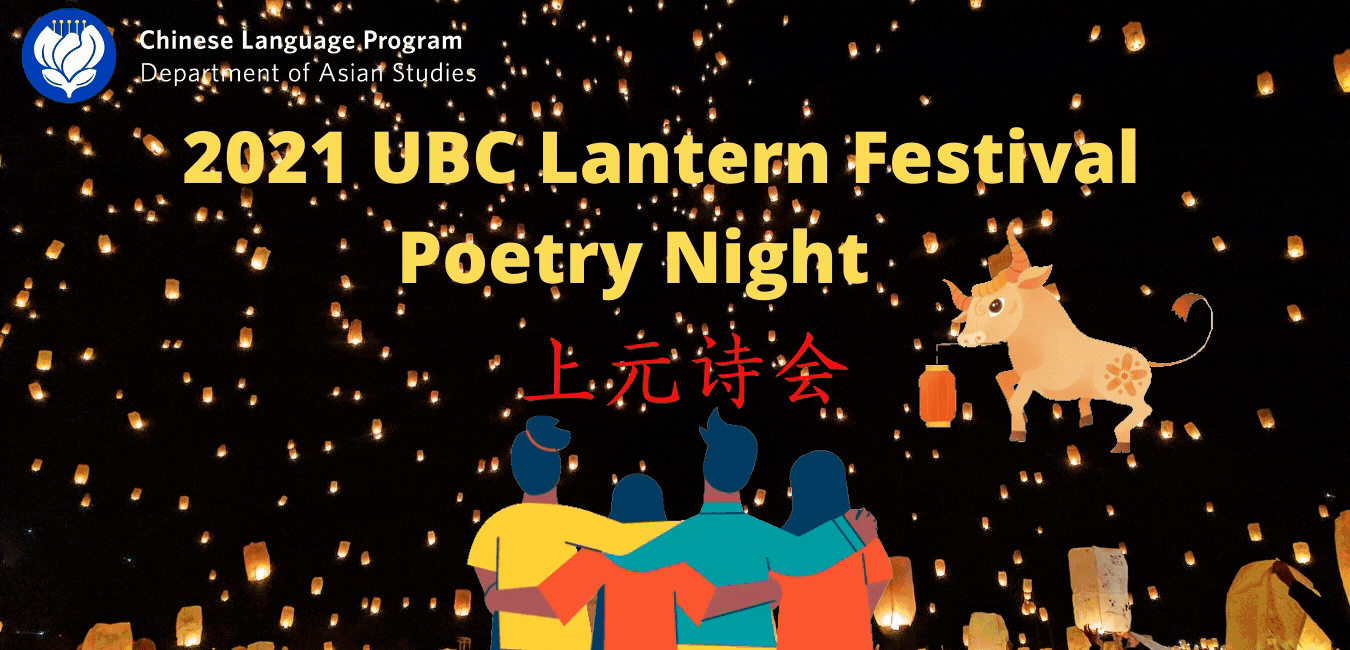The 2021 UBC Lantern Festival Poetry Event, the fourth annual extracurricular event organized by the Chinese Language Program, is drawing to a successful conclusion on April 9, 2021. The Covid-19 challenges restricted the event to Canvas (https://canvas.ubc.ca/courses/70968), but its talented organizers, contributors, and participants have in turn extended the event from Feb 26 to April 9 despite the pandemic, and have happily celebrated it with new forms and multilingual richness.
To date, the Event has seen more than 200 visitors, displayed 80 poetic artworks from students, and shared 10 multi-lingual presentations by the distinguished guest speakers from the Department of Asian Studies and the UBC Library.
Welcoming all participants with her Lantern Festival greetings on the Home page, Prof. Sharalyn Orbaugh, Head of the Department of Asian Studies and Professor of Japanese Literature, started off the poetry event with a passionate and poetic video message.
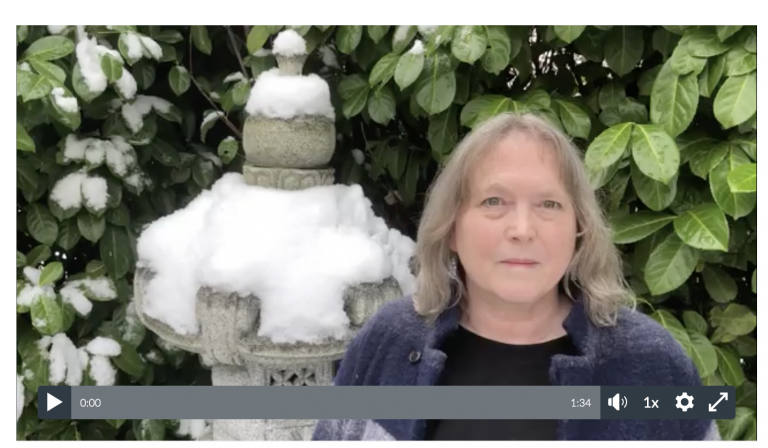

The Event showcases a kaleidoscope of guest poetry presentations, student talent demonstrations, lively audience discussions, Lantern Festival custom introductions, and riddle game sections. These activities form the core of the Event.
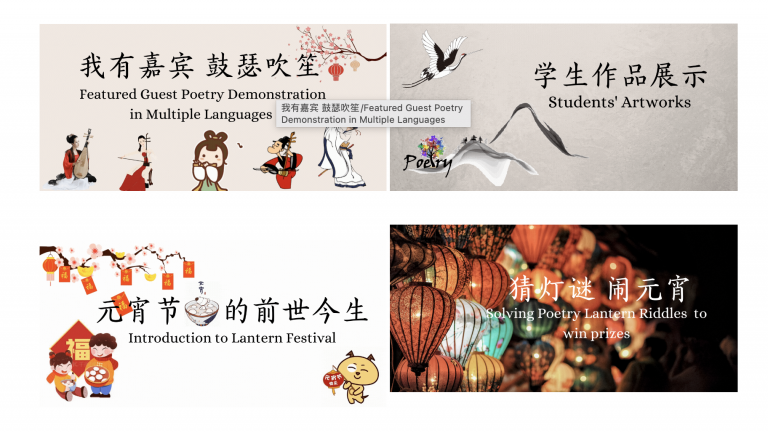

Presented in a cluster of Asian languages, the guests’ contributions have further illustrated the multilingual and intercultural dimensions of the Poetry Event. Prof. Jing Liu provided a detailed introduction to the classical Chinese poetry collection at the UBC library. Prof. Sunil Bhatt passionately recited a few poems of great pathos by Ghalib in Urdu. Prof. Hessam Dehghani illuminated the role of Persian literature in the landscape of world literature. Prof. Christopher Rea’s poem recital aptly demonstrated the polysemantic potential of modern Mandarin and the poetic genre’s capacity for interweaving the high and the low. Chanting the Korean poet Ch’ae Chegong’s Sinitic poems for a pestilence, Prof. Ross King situated these verses in both their original Choson Korean context and the current Covid-19 pandemic.
In the same vein, Prof. Haley Blum read out in Japanese a poem by the renowned Chinese poet Su Shi. Prof. Kay Duffy furthered this intercultural poetic weaving by introducing Lady Ise’s extensive adaptations of the “Song of Everlasting Sorrow” by Bo Juyi, another famous Chinese poet. Prof. Ayaka Yoshimizu shed light on several senryu poems by some diasporic women from Japan now living in America. The guest speakers’ multi-lingual presentations have greatly inspired heritage Chinese students’ interest to know more about poetry and the various cultures that have produced these poems. They are thereby more aware of the richness of the courses offered in the Department of Asian Studies and intrigued to search for more options in their future learning adventures.
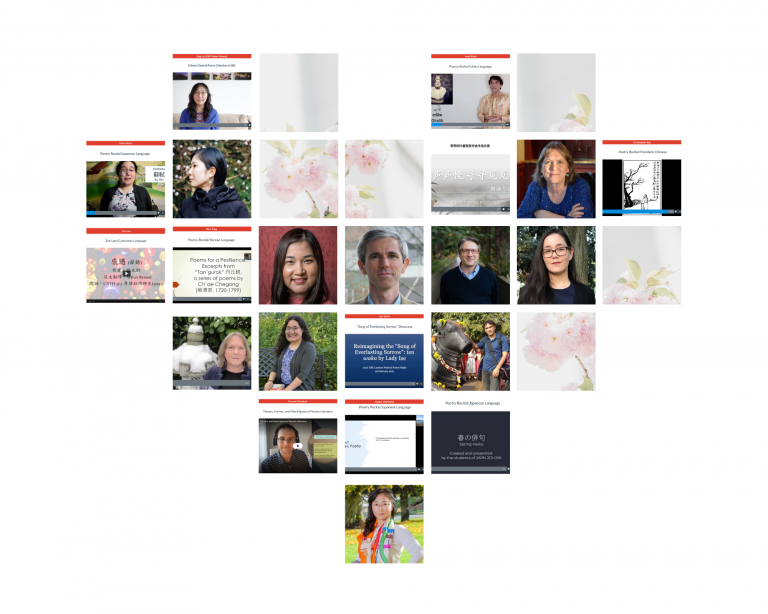

Students from courses outside of the Chinese Language Program have contributed to the multilingual celebration. The students from Prof. Nick Hall’s Japanese classes recited haiku poems in the spring, dubbed animations, and showed their photographic talents. Those from Prof. Zoe Lam’s classes recited in Cantonese a series of famous poems, which again displayed the varied acoustic potential behind the Sinitic poetic characters. Not only did the students read poems out loud, but they also engaged with the Chinese poetic repertoire in their own creative ways.
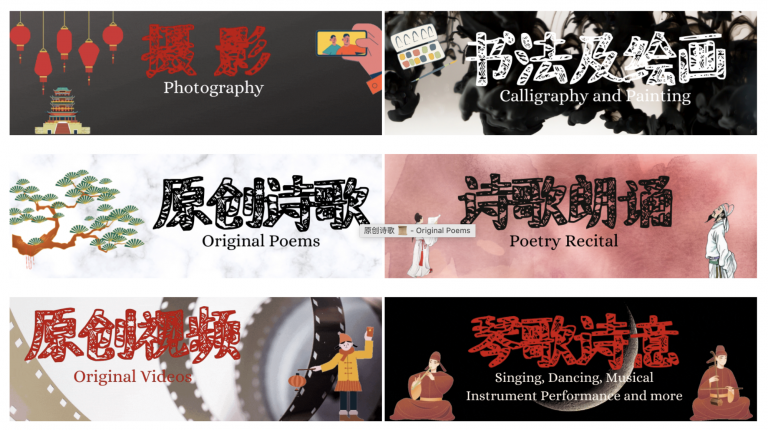

The Photography section exhibits a total of 27 pieces of photographs, three of which came from Han Jiamei (CHIN473 003) and depicted a serene evening dotted by Lantern lights in a Chinese water-side town. This single work received 17 likes from the audience.
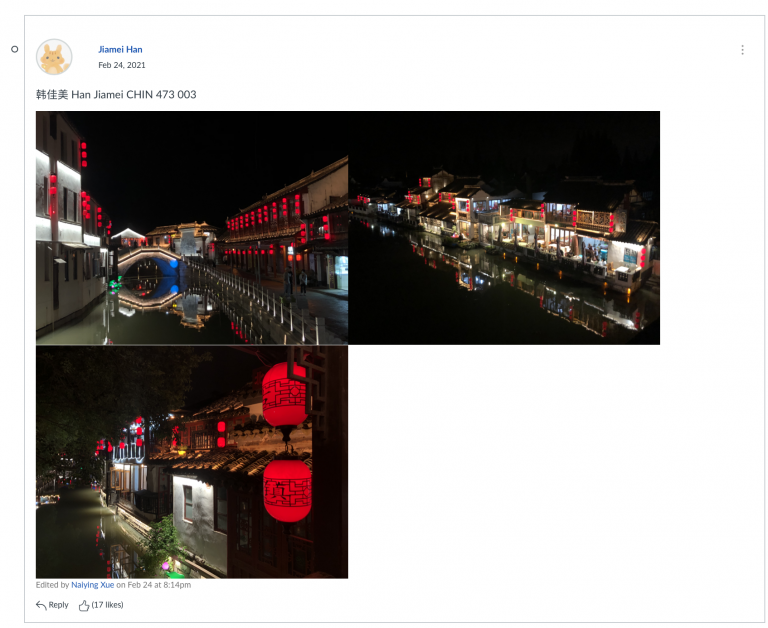

In the section on Poetry Performance, Melinda Cui (CHIN 493 003) impressed the audience by singing the classic Chinese poetry “Shuidiao getou” with her mellifluous voice accompanied by her sophisticated guitar playing, attracting a total of 23 likes and winning her third place in the multimedia exhibitions.
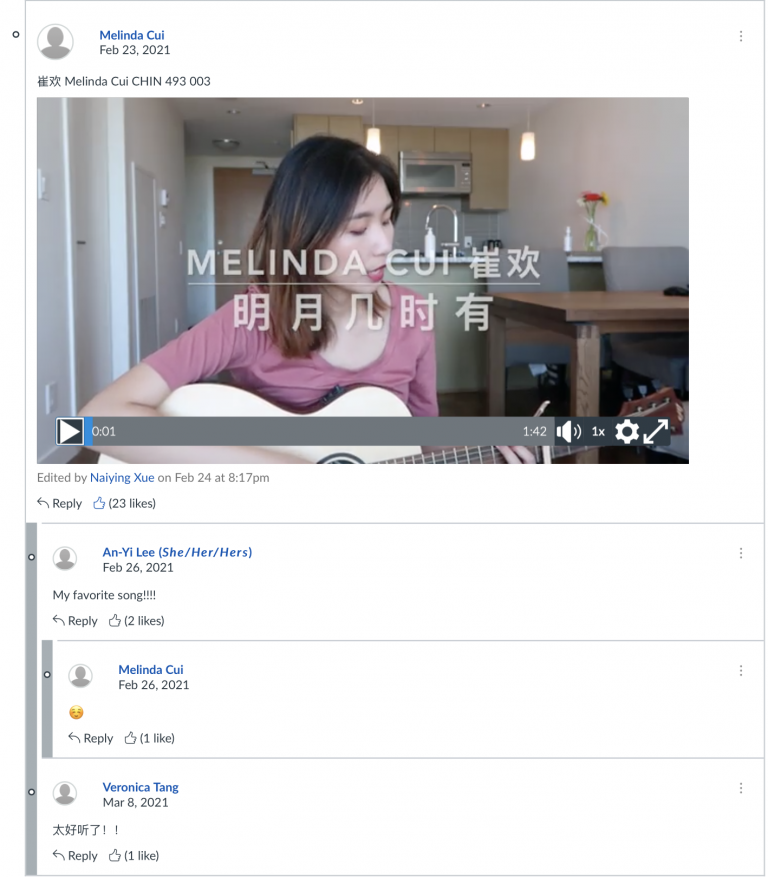

Meghan Meng’s poetry recital stood out from six fascinating performances. Along with Prof. Zheng Cai’s poetic and encouraging remarks, Meghan’s recitation set an excellent example for how to chant verses in an enchanting way.
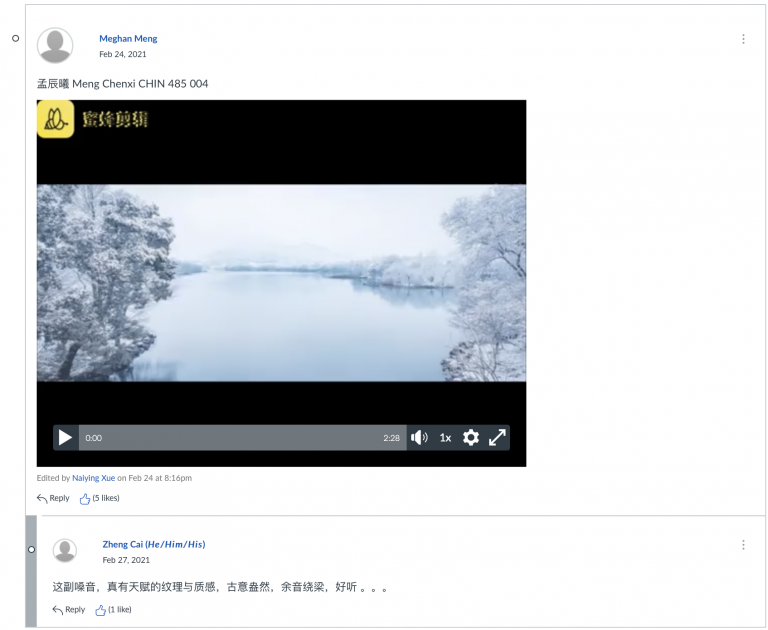

The Poetry Event received a sum of 18 artworks for the Painting and Calligraphy section. Yifan Wang’s (CHIN473 002) brushstrokes truly were a masterpiece. Her calligraphic work gave new life to the famous song lyric “Qing yu’an Yuanxi” by Xin Qiji and received 27 likes, winning the first place out of all 71 artworks.
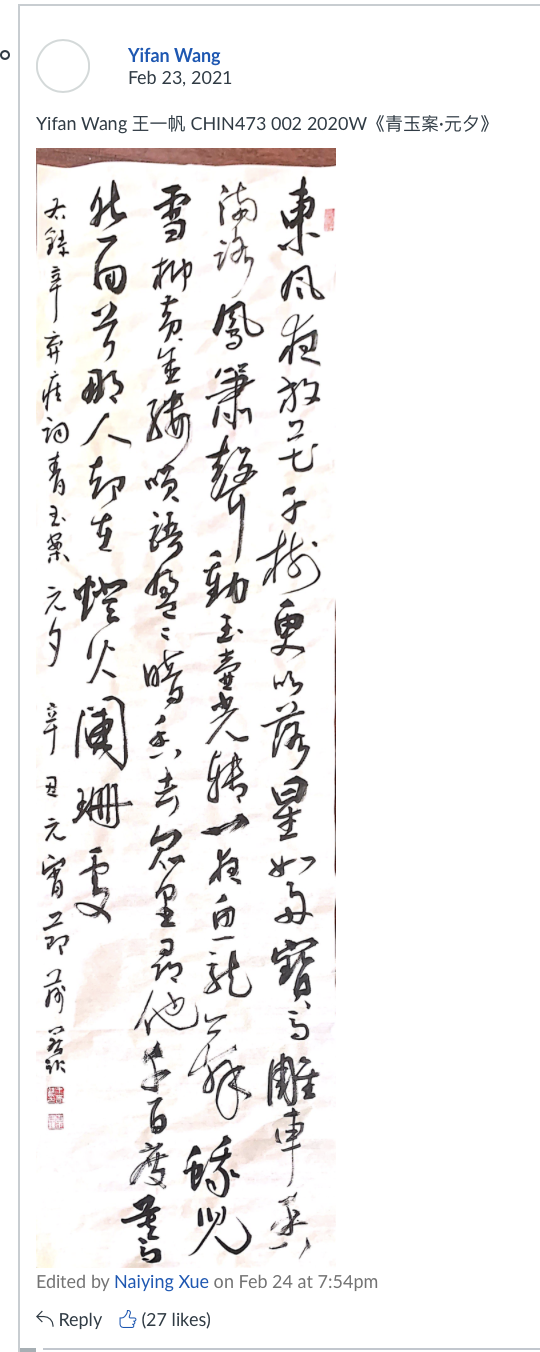

Ruoxi Xu’s (CHIN 473 003) beautiful calligraphic writing of two Chinese couplets won her second place with a total of 25 likes.
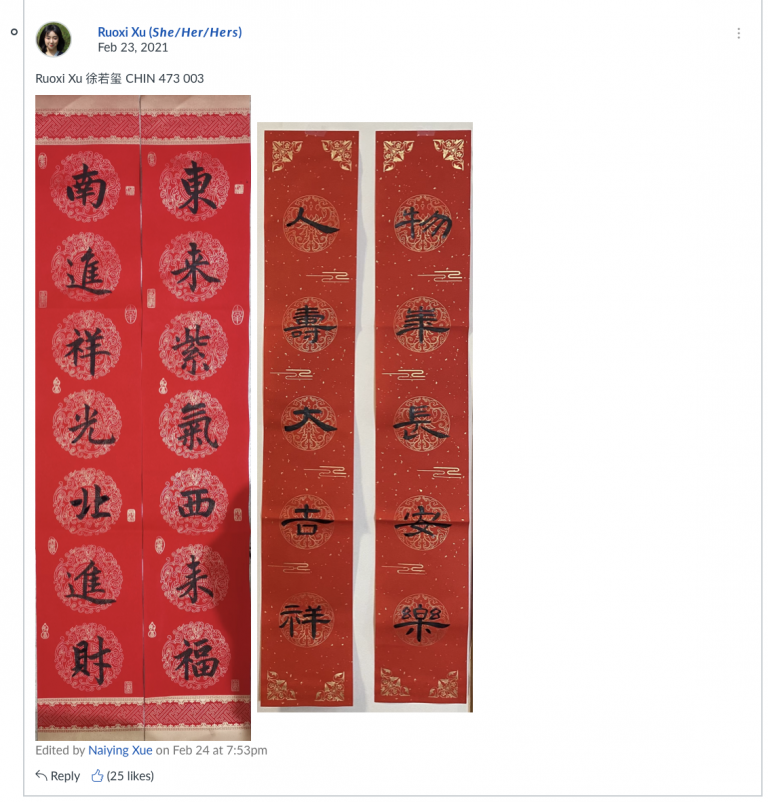

It is also notable that Haoting Yu’s (CHIN 473 002) skillful painting of plum blossoms attracted 17 likes in total.
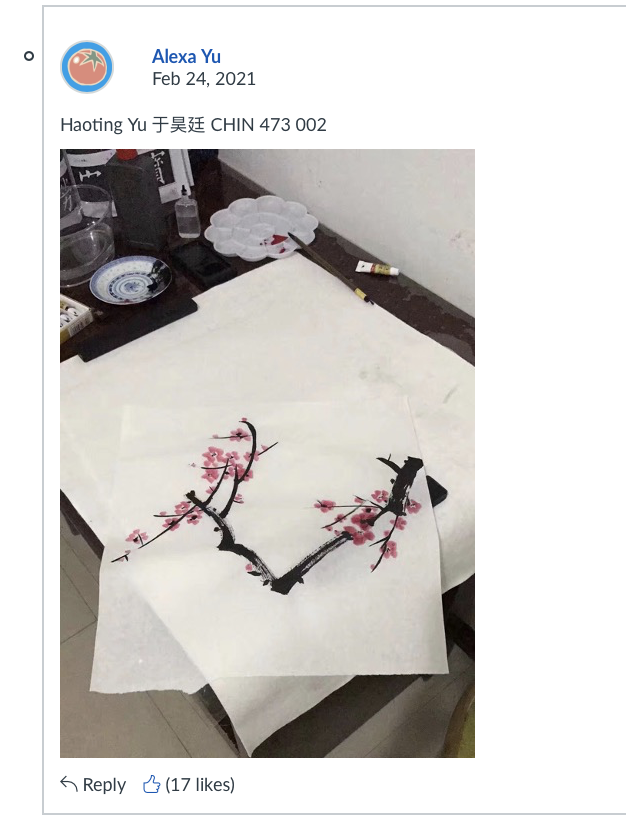

24 participants also tried their hands on composing their own poems. Among these splendid poems stood out Li Manning’s (CHIN473-002) poem, which received 11 likes in total and became the audience’s favourite original poem. Below is the featured poem:
辛丑年正月初二于家中聚餐有感而作:
碧湖棹歌美如画,
万里垂钓天若蓝。
丰年留客藕相伴,
稚子不知脆鱼酸。
Besides the feast of original poems, 4 original videos also furnished the Poetry Event. Prof. Zheng Cai shared his friend Elton Zhang’s video on a solo winter overnight trip in BC Windy Joe Lookout. The beautiful and peaceful scenery in the video caught everyone’s attention and enchanted the audience, making it the most popular video with 14 likes. Hooray for Prof. Cai and his friend Elton Zhang!
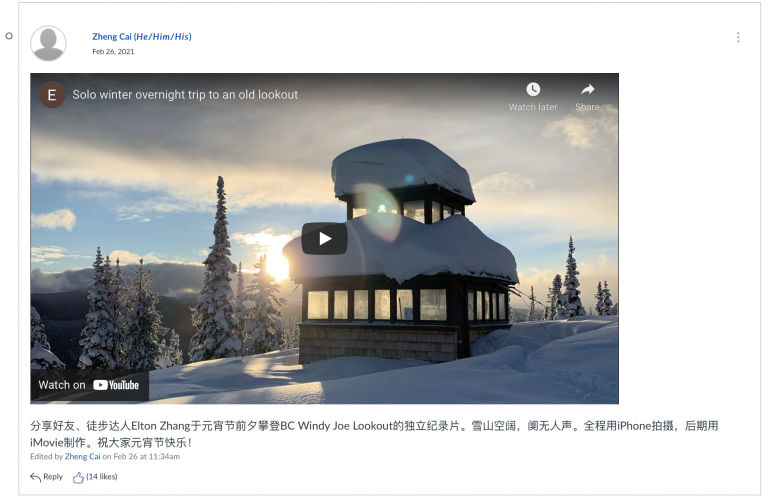

Quintus Huang (CHIN 483 001) enhanced the festivity by showcasing his adept cooking skills. We look much forward to trying his specialty dishes once the COVID-19 pandemic is over.
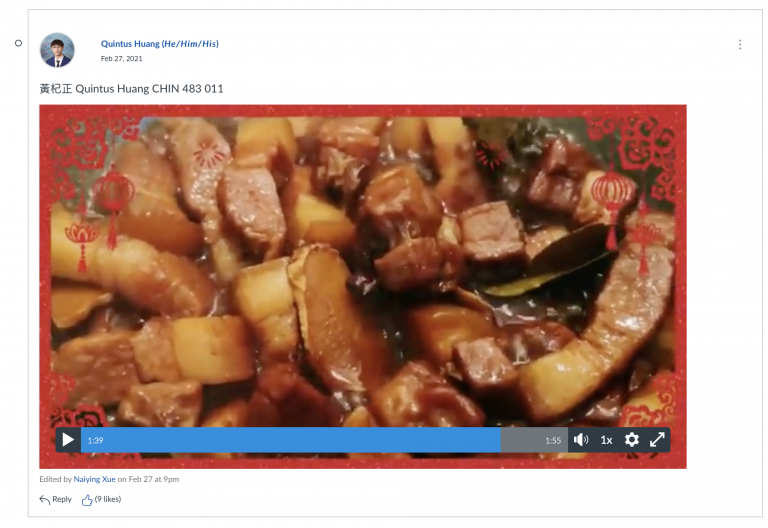

Not only did participants have great fun by engaging with Chinese poetry, but also helping each other figure out the key to various lantern riddles. Huge congratulations to the following three winners of the Lantern Riddle Games:
Zhuoran Feng: 16/20
XueYuan Li: 13/20
Daisy Di: 11/20


Both the participants and the audience gained a deeper understanding and appreciation of the origin, customs, traditions, and poetry of the Lantern Festival via the section that introduces the festival itself. Reading materials on both the Lantern Festival and the Feihualing relay enabled the participants and audience to broaden their knowledge of ancient Chinese poetry and foster their creativity and imagination.
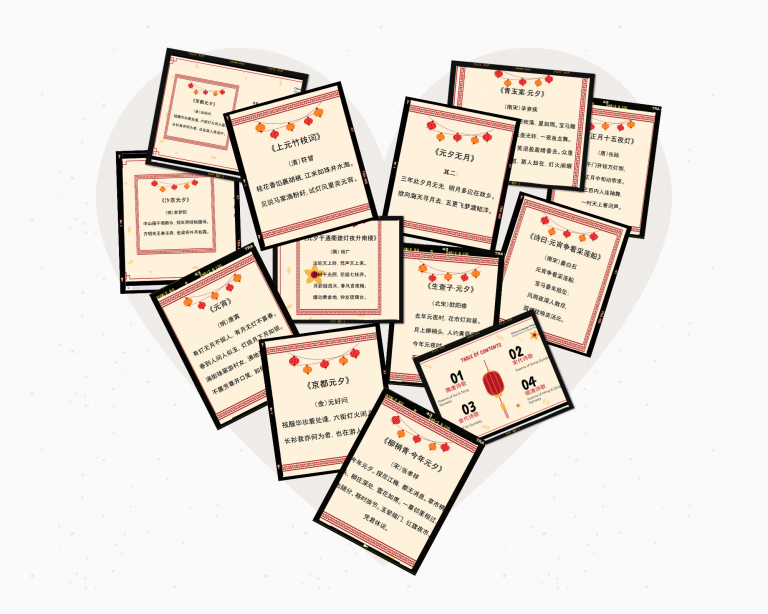

The students’ passionate participation is inseparable from the endeavors of the Chinese Language Program at UBC to offer a comprehensive range of courses on the Chinese poetic traditions. From early verses in the Classic of Poetry and the Songs of Chu, through medieval poems and lyrics of the Tang and Song dynasties, to modern colloquial poetry, these courses have immersed students in the most highly esteemed form of classical learning and inspired them to engage with the poetic tradition in creative and innovative ways. The Poetry Event, with its online platform, has functioned as a cultural hub that gathers together students located all over the world albeit the current pandemic.
The event has played a crucial role in connecting professors with students, participants with the audience, as well as people from various cultural and linguistic backgrounds in a virtual context. Through poetry, the Event has facilitated multilingual as well as intercultural communications and promoted community engagement on a large number of levels.
Last but definitely not the least, a special section in the online platform of the Poetry Event is devoted to showcasing Yuxin Guo’s achievement in winning the Chia-ying Yeh and Minsheng Scholarship. Amongst 15 winners of the scholarship, Ms. Guo is the only one from a North American university. Her poetry recital and elaboration set an exemplary case for how to understand and appreciate classical Chinese poetry, significantly promoting peer learning and inspiring more students to apply for the scholarship in the future.
In summary, the 2021 Online Lantern Festival Poetry Event has considerably enhanced intercultural communication, celebrated the Chinese poetic tradition, facilitated community connection, and contributed to peer-learning promotion. Although the pandemic has shut down the possibility of holding the Poetry Night in person, the participants’ creativity and the audience’s dedicated engagement have in turn inspired new ways of engaging with the poetic traditions. Being the very first online one of its kind, the Poetry Event opens up numerous new possibilities of holding future poetry events in more hybrid and innovative ways in the post-pandemic age.
